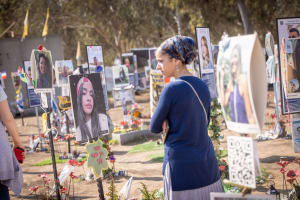THE WEEK AHEAD: Will a Knesset recess subdue the judicial reform drama? Is the IDF ready to confront Hezbollah? And why is gender-separated swimming controversial?
Here are the stories we are watching...

Judicial reform
Lebanon border
Gender-separated bathing
JUDICIAL REFORM
After two tumultuous weeks that peaked with the passing of The Reasonableness Standard Law, the Israeli Knesset is taking a summer break.
The legislature will re-convene in mid-October, after the Jewish High Holidays. Don’t hold your breath for more consensus-seeking negotiations. The political drama will not be taking a recess.
In September, the Supreme Court will review the Knesset’s contentious law with a historic panel to include all 15 justices for the first time ever. Supporters of the judicial reform claim this to be an absurd situation in which the court will discuss the option to strike down an amendment to Israel's quasi-constitutional Basic Laws. The court is not only conflicted by the case but its authority to strike it down is also debatable, they say.
Prime Minister Benjamin Netanyahu was asked by NBC News if he would abide by such a ruling. He replied: “I think we have to follow two rules. One is, Israeli governments abide by the decisions of the Supreme Court. And at the same time, the Supreme Court respects the Basic Laws [such as the law passed last week], which are the closest thing we have to a constitution. I think we should keep both principles, and I hope we do.”
LEBANON BORDER
Israel’s security cabinet will convene on Sunday to discuss rising tensions on the country’s northern border with Lebanon following Hezbollah’s recent provocation.
The terror organization, led by Chief Hassan Nasrallah, established an outpost north of the border fence but within Israeli territory. IDF Chief of Staff Herzi Halevi and Israeli President Isaac Herzog toured the area last week, vowing to make sure Israel maintains its sovereignty and the security of its citizens.
Officials in Netanyahu’s government have been placing the blame for Hezbollah’s increased aggressiveness - in both actions and threats - on the previous government of Naftali Bennett and Yair Lapid. Through American mediation, the Bennet-Lapid government had signed a controversial maritime border agreement with Lebanon, which both Hezbollah and the political right in Israel see as the Jewish state capitulating to Lebanon’s demands.
As part of the discussion, the security cabinet will also review the IDF’s combat readiness. This comes after 10,000 reservists announced they would no longer show up for duty in protest of the government’s push for a judicial overhaul.
GENDER-SEPARATED BATHING
Israeli Environmental Protection Minister Idit Silman will launch a controversial pilot program for gender-separated swimming at natural springs in Israel's national parks this week. The segregation between genders for observant Jews will only take place during certain designated hours, beyond the official operating times for mixed-gender bathers.
Silman said she expects that "even the greatest pluralists will welcome the attempt to allow every woman and man to enjoy nature resources according to their faith and religion."
Nevertheless, the initiative came under fire by some secular Israelis who see the move as religious coercion, as well as an infringement on their civil rights.
The pilot program will initially include only two Israeli government-run parks: The Ein Tsukim Nature Reserve near the Dead Sea and Gan Hashlosha National Park (Sahne) near Beit Shean.
This week we are also keeping an eye on these developing stories:
… Is a Saudi-Israel peace deal possible?
… Is there any chance Israeli lawmakers will seek to form a unity government?
… Will Israel's Supreme Court rulings start a ‘constitutional crisis’ this summer?
… 3 felony cases, 2 civil lawsuits, 2 federal indictments: What's next in Trump’s legal issues?
… Why males and females should not share the same bathrooms.

The All Israel News Staff is a team of journalists in Israel.













